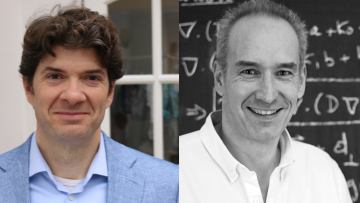Representations of p-adic groups – with a twist
Abstract
The Langlands program is a far-reaching collection of conjectures that relate different areas of mathematics including number theory and representation theory. A fundamental problem on the representation theory side of the Langlands program is the construction of all (irreducible, smooth, complex or mod-$\ell$) representations of p-adic groups. I will provide an overview of our understanding of the representations of p-adic groups, with an emphasis on recent progress including joint work with Kaletha and Spice that introduces a twist to the story, and outline some applications.
Today Oxford Mathematicians Fernando Alday and Alain Goriely have been elected Fellows of the Royal Society (FRS) for their outstanding contributions to science.
Cyclic cohomology and generalized formal degrees for Affine Hecke algebras
Abstract
In this talk I will introduce affine Hecke algebras and discuss some of their representation theory, in particular their Fourier transform. We will consider discrete series representations and how their formal degrees can help us understand them. There is no quantity like the formal degree available to help us similarly study limits of discrete series representations. I will sketch how this difficulty might be overcome by using cyclic cohomology and its pairing with K-theory to introduce generalized formal degrees.
Arithmetic Topology and Duality Theorems
Abstract
I'll introduce the classical arithmetic topology dictionary of Mumford-Manin-Mazur-Morishita-etc. I'll then present an interesting instance of parallel phenomena related to symplectic structures on moduli spaces of certain bundles. The arithmetic side turns out to be an application of Poitou-Tate duality. Depending on time, I'll delve into the delicate details which make the analogy useful for Diophantine geometers.
Random matrices with integer entries
Abstract
Many classical arithmetic problems ranging from the elementary ones such as the density of square-free numbers to more difficult such as the density of primes, can be extended to integer matrices. Arithmetic problems over higher dimensions are typically much more difficult. Indeed, the Bateman-Horn conjecture predicting the density of numbers giving prime values of multivariate polynomials is very much open. In this talk I give an overview of the unfortunately brief history of integer random matrices.


